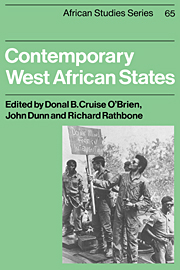11 - Conclusion
Published online by Cambridge University Press: 10 December 2009
Summary
In interpreting the political history of post-colonial Africa it is helpful to bear in mind three simple contrasts. The first is a contrast in cognitive orientation: between the project of explaining the course of its political history and that of appraising the significance of this political history. (Each of these projects makes its own distinct demands, since the epistemic ideal of the former is a very high degree of detachment, while the latter cannot even be coherently attempted without at least an implicit evaluative commitment on the part of the interpreter.) The second contrast, important both explanatorily and for the appraisal of political significance, lies between the inherent transience (the permanent vulnerability) of all political achievement and the relative potential longevity of political destruction. (This contrast is close to being a universal of human political experience. But it has gained increasing salience from the massive human weight of state power in the modern world.) The third contrast, again bearing uneasily both on explanation and on appraisal, falls between three different conceptions of the nature of the state: between the state as an agency of development, the state as guarantor of the physical security of its citizens or subjects, and the state as an (always potentially chaotic) arena of struggle. Two of these conceptions may well appear somewhat trustingly normative, and the third to be both unmistakably explanatory and irreproachably detached.
- Type
- Chapter
- Information
- Contemporary West African States , pp. 181 - 192Publisher: Cambridge University PressPrint publication year: 1990

